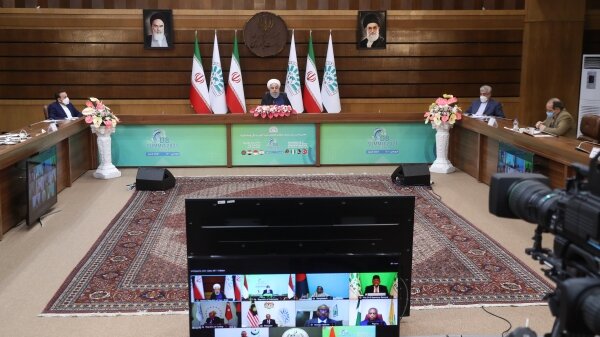U.S. measures to bring Iran to its knees failed, Rouhani says

TEHRAN – President Hassan Rouhani has denounced U.S. sanctions on Iran as “economic terrorism,” underlining that these measures failed to bring the Iranian people to their knees.
The president made the remarks on Thursday at the 10th virtual D-8 summit.
“Further to the disaster of COVID-19, unilateralism, economic terrorism and the way they have been addressed are among the issues that have stained the features of the international community. Actions like these not only illegally and illegitimately target sovereign governments and independent nations, but are also a serious threat to the achievements of the international community. More to this, the world of Islam has fallen quarry to organized Islamophobia. This organized Islamophobia has not only targeted the sublime values of Islam, but it has also brought with it wider adverse economic and developmental consequences for Muslim countries.”
He took pride in the fact that the U.S. economic pressures on Iran ended in failure.
“I am proud to announce that the U.S. illegal and unilateral measures aimed to bring the great nation of Iran to its knees have failed and despite the strong headwind of colossal economic pressure, by relying on our own willpower and domestic might, we have managed to do great feats and make significant breakthroughs in various areas including the fight against COVID-19 pandemic and its impacts and consequences. The illuminous testament to the failure of the United States in the war it has waged on the Iranian people is that Iran, struggling with sanctions and the coronavirus combined, managed to secure an economic growth of more than 2 percent in the year when the world economy shrank by 3.5 percent and many countries experienced negative economic growth of -5 to -10 percent,” the Iranian president noted.
He added, “In the past four years, the international community has witnessed as the U.S. economic warfare against Iran has intensified. These oppressive sanctions have inflicted substantial damage on our country. The nuclear deal, which the U.S. violated and maximally tried to obliterate, has been preserved owing to the Islamic Republic of Iran’s tactfulness. The U.S. must return to the JCPOA, first, by lifting the sanctions and adopting practical arrangements; for that is the obligation of the same government that has reneged on the promise. The Islamic Republic of Iran will but respond to U.S. action by positive action.”
Rouhani also reaffirmed the will of the Islamic Republic of Iran and the country’s public and private sectors to deepen cooperation within the framework of the D-8.
He reiterated Iran’s willingness to strengthen multilateralism as one of Iran’s top priorities.
“Strengthening multilateralism is one of the Islamic Republic of Iran’s top foreign policy priorities. From the standpoint of economic development, too, we have invariably supported the developing and attuned countries’ collective strive for a fair and non-discriminatory international economic system. The ultimate goal of all these collective and legitimate efforts by developing countries is to attain economic growth, balanced development, public welfare and prosperity, and to preserve national values and cultures and secure a decent status in international relations,” Rouhani pointed out, adding that “it is by way of this very approach, that we have become an active member of international and regional groupings such as the Group of 77 (G77), Indian Ocean Rim Association (IORA), Economic Cooperation Organization (ECO), Cooperation Mechanism of the Caspian Littoral States, and, of course, the D-8. From the vantagepoint of convergence and business interaction, we are laying the foundations of free regional trade with neighboring countries and we will soon establish, together with the Eurasian countries, the first free-trade zone.”
Rouhani said that despite its geographical dispersion, the D-8 organization enjoys tremendous capacities and bounties of, inter alia, human and natural resources, energy reserves, complementary economies and avid private sectors.
“Further, we all have more or less similar challenges on our paths to economic development.”
He added, “Ever since the dawn of the D-8, the Islamic Republic of Iran has endeavored to play its part in the accomplishment of the lofty objectives of the organization. Such measures as the establishment of the D-8 International University and D-8 Technology Transfer and Exchange Network, which, combined, target two key areas of ‘education and human resource development’ and ‘development of technological cooperation’ among eight countries, are testimony to our efforts. We are fully prepared to participate in the operationalization of D-8 agreements in IT, trade facilitation, investment, agriculture, petrochemicals, science, health, tourism, and facilitation of visa issuance,” Rouhani continued.
He noted, “Given the importance of foreign trade for national development and public welfare of the great people of D-8 member states, I would like to stress that the current trade volume among the eight countries is a far cry from the actual trade potentials of the D-8. As such, it is necessary that certain mechanisms be developed for the facilitation and promotion of trade among member states, including through customs and banking facilities and mechanisms as also non-banking ones. In this context, such proposed initiatives as a D-8 chamber of barter trade and D-8 credit cards may be helpful.”
